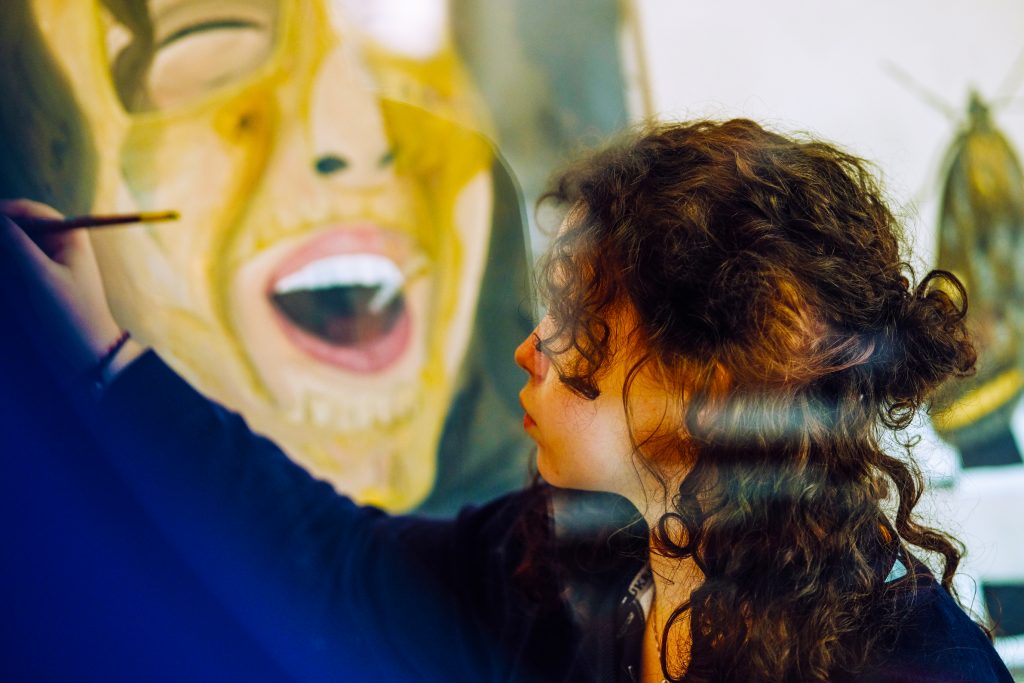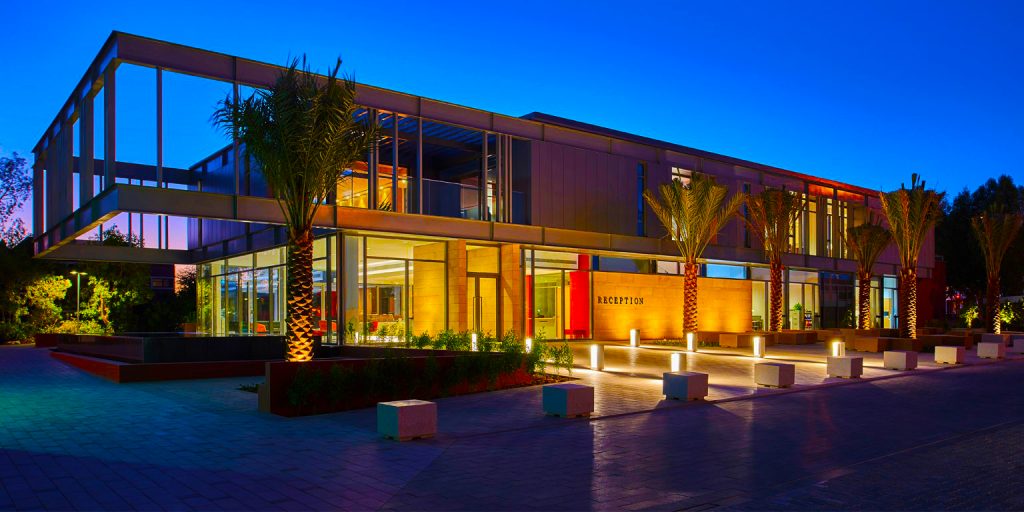Background. Stories from the Edge of the Future – A Guide to Applying for University.
Student Voices Series.
“Teacher to a Musician, Dolphin Trainer to Real Estate Agent, Lawyer to Vet. How I discovered my Future in Architecture and Design at Dubai College.”
In the fifth of a special series of articles, Danae Giannarou, a Sixth Form student at Dubai College, writes of her personal journey applying for university and the many discoveries made by her through the Odyssian voyage of twists and turns she encountered in the process.
Exploring many ups and downs, Miss Giannarou speaks directly with SchoolsCompared about grappling with the biggest jump into the future facing students in the final years of school; applying to university and the challenge of deciding what next…
What do we learn? Many things, including that rejection hurts us all but is survivable; that making good decisions rarely comes without considerable thought and soul searching – and that human beings are not boxes. We forego our passions and what inspires us at our peril. Life is just too short…
Each student in this Student Voices series of articles from SchoolsCompared, was given free reign to describe their experiences and to offer their advice to fellow students, and families, facing the many dilemmas, struggles, and sometimes sleepless nights, of what comes after school – and the best ways, for each of them, of getting there.
It takes no small amount of courage to agree to put your name to an article in a such a public forum, and we extend our enormous gratitude – and (giant) heaps of praise, for each of you who have taken the plunge to contribute and placed yourselves above the parapet.
For many of our contributors, this will be the first time that they will have had their names in print – well done! Who knows, maybe we shall see you in the years to come as a journalist, architect, designer… or, just perhaps, Dolphin Trainer, changing the world, one step at a time.
In the following in depth article, Miss Giannarou writes openly about changing courses, prioritising what is important in life, being ambitious against even the stiffest odds and, ultimately about the centrifugal importance of having, and retaining, faith in yourself.
Throughout, Miss Giannarou, indirectly reveals much about her school, Dubai College, and the hugely creditable ways that it worked with her to adapt to her needs and ambitions as they evolved over time – and supported her, fought for her, throughout a sometimes hugely dispiriting application process that would have tested the most resilient of us.
Finally, Miss Giannarou brings hope to all of us that find ourselves following a path that we wish to change. In a way her uplifting story is one which, above all, brings to life that things do change in life, and we should never be fearful of this, or be trapped on journeys that no longer meet our aspirations.
“Teacher to a Musician, Dolphin Trainer to Real Estate Agent, Lawyer to Vet. How I discovered my Future in Architecture and Design at Dubai College.”
by Danae Giannarou. Year 13. Dubai College. Summer 2021.
“From a very young age we are constantly asked “what do you want to be when you grow up?”
As children, we think of a career that sounds the most fun or simply follow in our parents’ footsteps. As we grow older, this becomes a more pressing question with a lot more meaning to it as the time left to decide gets shorter and shorter.
Personally, I have been interested in nearly every possible career choice, from teacher to a musician, dolphin trainer to real estate agent, lawyer to vet and so on. Once I got to Sixth Form, however, I knew that I had to make a decision; a task I have always found difficult.
The thing with Sixth Form is that you have to decide what interests you when picking your A-level subjects, or what subjects you will need to pursue that interest you. I started with 4 A-levels which I decided based on the GCSE’s I did the best in, but still enjoyed – Maths, English Literature, Economics and Physics. As the weeks went on, I was still trying to decide on a career path to pursue so I could begin my university research.
I began to enjoy my subjects less and less since I had dropped all of my creative subjects. This is what brought me to a crucial realisation – I needed to pursue something in life that was creative, but also critical. This is how my research process began, by googling “logical and creative careers” as well as taking a ‘fast tomato’ quiz, which led me to a career path I had never even considered – Architecture.
I started to research what an Architect does as well as the qualifications required. I had to share all my newfound excitement with someone, and, being at a new school, I only had the people in my Form to talk to. I don’t know if this was pure coincidence, or a sign from the universe, but the Year 13 girl that I spoke to about it was also looking at pursuing a career in Architecture. Her advice was for me to study A-level Art, leading me to do just that. I swapped Economics for Art on the basis that I did not need Economics to qualify for an Architecture course.
My application process was far from simple.
I applied to a total of 10 universities across the UK, the Netherlands and Ireland. Whilst I knew the UK was out of the realms of possibility for me due to financial issues, I felt I still owed it to myself to apply, not only because I had been following British education for the past four years, but to see where I possibly could have ended up. Being originally from Greece, and having lived there for the first 7 years of my life, I knew I wanted to move back to Europe and away from city life.
When deciding what countries to apply to, I had to decide what was important to me.
This came down to five categories: general atmosphere, scenery, culture, finance and social life. An externally important aspect I also had to consider was not only the language the course is based on, but the main language spoken in that country. This is when I started crossing off countries like Italy, Spain and France. What really interested me about Ireland and the Netherlands was the international culture that both share with Dubai – but with the benefits of weather and scenery that is very similar to Greece.
My decision on which universities to apply to was based on what the course entailed, the area the university is in, how they aid students after university and the campus itself. Personally, it is important for me that a campus includes personal study areas as well as group study areas, sports centres and things like a coffee shop or restaurant. As most universities in Europe do not offer on-site accommodation, it was also important to check if they help you find a place to live, which most of them do.
The main issue I had with universities in the Netherlands was finding courses in English. I had to use many websites such as studielink and eunicas to make this process easier, but what really helped me was using global university ranks for Architecture and narrowing it down to those based in the Netherlands and Ireland. Through this process I decided to expand my course horizons from just Architecture to courses such as Art History, Design, Art Media Design and Architecture and Landscape Architecture.
After finding a few names, I started making lists of what each university had to offer. I ranked each of these out of 5 stars based based on which met my categories the best. This left me, finally, with 5 universities to apply to across both countries. I ensured that I was qualified to apply to each course I selected based on my GCSE and A-level requirements. At this point I began the formal application process.
The UK was, relatively, the easiest one as it just required me to complete the UCAS form, alongside a personal statement.
For Ireland, there is a portal called CAO which is similar to UCAS, where you add your details and select the courses you are interested in. Once my application was submitted, I was asked to send my GCSE results and A-level predicted grades by post, which is not simply done in the UAE.
For the Netherlands, each university had a set application process which had to be completed through their website. It would usually follow a link taking you through the studielink portal to finalise your application.
All the universities I applied to required me to fill out a personalised form for that course. However, each university had a different process. For example, I had to make specific projects for one university, another university asked me for a portfolio and had an interview process. The final university asked me to complete a quiz to determine my fit for their course!
Interviews can be nerve-racking, but it’s an opportunity for you to see if you really want to go to this university – as well as to see if you are the right choice for them. My biggest advice, honestly, is to stay calm and remember you’ve got to this stage for a reason – they want to get to know you as a person. Make sure you show your people skills – smile, be respectful and ask questions.
The more questions you ask the better.
Then, after some university consultations with my Head of Sixth Form, we decided it would be beneficial for me to drop Physics A-level and stick with 3 A-levels, which we did not expect would cause any issues.
Once offers started rolling in, I felt like I was on top of the world – until one of my universities informed me, they had changed their requirements. I appealed their rejection letter with the help of my Head of Sixth Form, who wrote an appeal letter trying to convince them I have the knowledge required to take their course, which they kindly denied. Rejection is really hard and no one can convince you otherwise in that moment, but it really isn’t the end of the world.
Situations like these are why it’s important to have “safety” options in other universities. Getting rejected from university is not the end of the world, especially because you have other options that you are equally (if not more or slightly less) interested in. When facing rejection, just keep your head up and trust that it just wasn’t meant to be.
I’m also lucky enough to have a sports scholarship place in a local university so I did have a Plan Z if everything else had not gone as expected. Having backup plans is always important, whether your backup is a different course, university, country or even a completely different path like a gap year.
The entire research and application process can start feeling overwhelming, as you must keep in mind that you are planning your future. Remember that it’s YOUR future and no one should get to influence that. You are in control of what happens and if chance comes to chance that you don’t get your top choice, you will still end up somewhere you like. Your hard work will start to pay off once you get the first e-mail headlined “congratulations”, but it will soon start to feel like a bitter-sweet moment. Like most kids growing up in the UAE, we are used to the idea of temporary – no one stays here for too long. This doesn’t have to be a scary thing, in fact, it’s exciting! You’re about to start the future you have decided for yourself and you have worked hard for.
A summary of my advice? Remember to look at the country you’re applying to, not just the course; always find what’s most important for you; have backup plans; and, most of all, remember that rejection is not the end of the world.
Good luck with your application process.
Your future starts now!”
Danae Giannarou. Dubai College. 2021.
Notes for students and parents.
Established in 1978, Dubai College is one of the UAE’s ‘Ivy League’ not-for-profits with a reputation for academic excellence that is pretty much unrivalled in the UAE. Dubai College is at least arguably the only truly academically selective school in the UAE, but its reputation for delivering an outstanding education for its students extends beyond more traditional academic subjects into Art, Design, Music, the Performing Arts and Sport. It’s a school in which many academically gifted children and polymaths find a natural home, with exam results that place it on the map with some of the very best British curriculum schools worldwide.
The new Reception Building at Dubai College taken at night. The reception building is the latest phase of development for the school and was designed to act as a contemporary student gateway to the existing campus whilst providing a new visitor arrival experience, purpose built offices and centralised staff facilities. “Dubai College has a leading reputation as a traditional school that delivers quality education – however it also has a charm and quirkiness that we wanted to maintain. It’s fundamentally a British school but very firmly rooted here in the Middle East with its juxtaposition of British quadrangles (or Arabic courtyards) and low density clusters of single and double storey faculty blocks,” said Jason Burnside, partner at Godwin Austen Johnson.
Click to read our independent review for parents of Dubai College here.
Learn about why we rate Dubai College outstanding in its provision for the Performing Arts here.
Click to visit the official web site of Dubai College here.
Click to read an interview with Iraqi Architect Zaha Hadid here.






































































Leave a Response